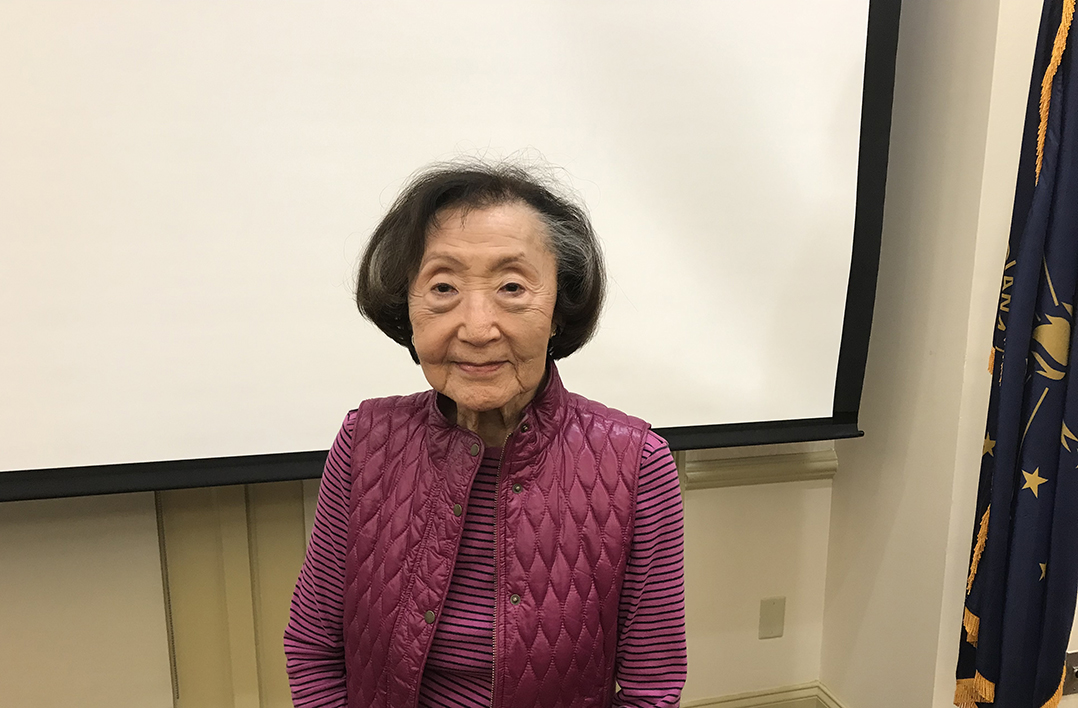Jean Umemura experienced a situation that is viewed by historians as one of the greatest civil rights injustices by the U.S. in the 20th century.
During World War II, Umemura and her family were among 120,000 Americans of Japanese descent sent to internment camps. President Franklin D. Roosevelt established an executive order for the camps for fear of espionage.
Umemura, 95, shared a detailed account of her life at that time May 20 with her fellow residents from The Barrington of Carmel.
Prior to Pearl Harbor, Umemura lived a happy life, loved riding her bike and playing the piano.
A retired elementary school teacher from Washington Township in Indianapolis, Umemura was growing up in Seattle when the Japanese attacked Pearl Harbor on Dec. 7, 1941.
“I remember how devastated my parents felt knowing their countrymen attacked the country that we lived in and loved,” she said. “My parents also became afraid. Would our American friends and neighbors question their loyalty? Would my parents be considered enemy aliens?”
Umemura, then 14 and attending school, said the principal gathered the students in the auditorium the next day, where the students listened to Roosevelt’s broadcast declaring war on Japan. She felt all the eyes of her classmates were on her.
“I always felt proud to be an American, but somehow I felt like the enemy, probably because I looked like the enemy,” she said. “A very sad feeling and shame went through my body. The weeks that followed became a nightmare for many people of Japanese ancestry.”
Umemura said community and business leaders, editors of Japanese newspapers, Japanese language teachers and even religious leaders were rounded up by the FBI and put in jail without any reason given.
Umemura, who grew up with an older sister and a twin brother, said it was a time of fear and worry. Umemura’s father, who had a dry-cleaning business, was not taken, but there was plenty of anxiety. A curfew was enforced.
“We couldn’t leave our homes from 8 p.m. to 6 a.m.,” she said. “They had a 5-mile limit from their home. We continued to attend school. Business for my parents took a downturn. My piano teacher asked that I not play in a recital that was coming up.”
Umemura said the family was given the option of returning to Japan, but the family prayed about it, and all decided to stay.
The family was first were sent to a temporary camp in Puyallup, Wash., where the state fair previously was held.
“The places where the horses, cows and pigs and different animals stayed, they converted that into where we lived,” Umemura said. “So, you know it wasn’t very clean, and in fact it was very disappointing.”
Umemura lived there with her parents and brother from May to September 1942. Her sister was allowed to live with a minister and continued to study violin. There were no schools at the camp.
“We had to stand in line for food,” she said. “They gave us a gunny sack, and we had to fill it with straw, and that was our mattress.”
The walls were so thin Umemura could hear people arguing and snoring in other rooms.
“We had to stand in line to go to and to be fed,” Umemura said.
Umemura and her family were later moved to a permanent camp in Minidoka, Idaho.
Umemura said the camp was guarded by armed guards, but no one tried to escape or caused trouble.
Six families lived in one barracks with one room per family, unless one had a large family of six or seven children, and then they would get two rooms.
Schools opened in October, a month after the family arrived.
Her sister had met a minister from Ann Arbor, Mich., while attending a music camp in Wisconsin. He offered to help sponsor the family and find her parents a dry-cleaning job and apartment in Ann Arbor, and they were finally able to leave camp.
Umemura said no one from the internment camp was ever charged with spying. In 1988, President Ronald Reagan signed a bill to compensate those sent to internment camps.
Umemura taught at Allisonville Elementary School for 29 years, has three children, seven grandchildren and eight great-grandchildren. Her husband, George Umemura, died at age 97 in May 2021. George, who worked at Eli Lilly, spent four months at an internment camp before being allowed to attend Ohio Wesleyan University.



